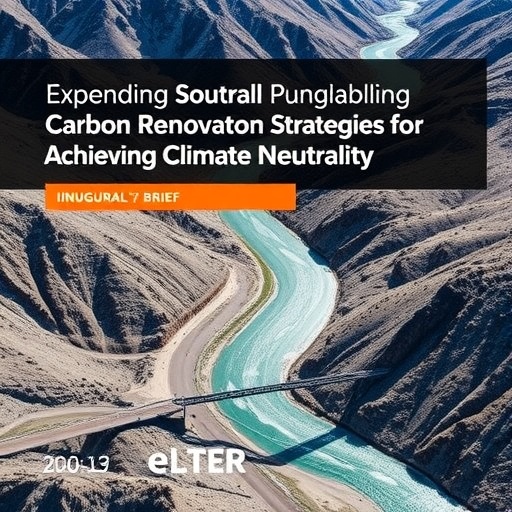The interconnected crisis of climate change demands innovative and multifaceted solutions that extend beyond merely curtailing greenhouse gas emissions. The European Long-Term Ecosystem, Critical Zone and Socio-Ecological Research Infrastructure (eLTER RI) has recently unveiled a landmark policy brief titled “Scaling Carbon Removal: Integrating Nature-Based and Technological Solutions for Climate Neutrality,” signifying a pivotal contribution to global climate discourse. This document not only addresses the urgency of mitigating carbon emissions but also emphasizes the critical role of carbon dioxide removal (CDR) technologies, combined with nature-based approaches, to achieve climate neutrality as outlined in the Paris Agreement.
Recent years have seen a mounting consensus within the scientific community that limiting global warming to well below 2°C—and preferably 1.5°C—relative to pre-industrial levels requires extensive deployment of carbon removal strategies. While emissions reductions remain fundamental, eLTER’s policy brief underscores that natural ecosystems alone cannot absorb carbon dioxide at the scale or speed necessary. Forests, soils, wetlands, and peatlands serve as essential carbon sinks, yet these systems are increasingly jeopardized by anthropogenic land-use changes, climate stressors, and degradation. Consequently, reliance solely on these natural carbon reservoirs is insufficient for reversing the trajectory of climate change.
The brief advocates a dual-pronged strategy that integrates advanced technological interventions such as bioenergy with carbon capture and storage (BECCS) and direct air carbon capture and storage (DACCS) alongside ecosystem preservation and restoration. BECCS combines biomass energy generation with carbon capture technology to sequester CO₂, potentially creating negative emissions by locking carbon underground. DACCS, on the other hand, involves chemically extracting CO₂ directly from the atmosphere and securely storing it, offering a scalable solution amenable to integration with other climate mitigation efforts. Both methodologies represent frontier innovations requiring considerable research, development, and policy support before deployment at scale.
Recognizing the nascent state of many CDR technologies, the eLTER RI policy brief calls for substantial investment in research and development (R&D) to overcome technical and economic barriers. R&D funding is imperative to enhance the efficiency, scalability, and cost-effectiveness of carbon removal approaches, as well as to assess potential co-benefits and risks. Critical research domains include advances in sorbent materials for DACCS, sustainable biomass supply chains for BECCS, and the ecological impacts of large-scale land use dedicated to afforestation or reforestation projects. An integrated scientific approach spanning ecological, technological, and socioeconomic disciplines is necessary to optimize carbon removal solutions.
A key recommendation included in the brief emphasizes the harmonization and standardization of carbon sink measurement and monitoring protocols. Reliable quantification of carbon sequestration and emissions is vital for verifying the effectiveness of nature-based and technological interventions. Developing consistent methodologies facilitates transparency, accountability, and comparability across geographic scales and governance frameworks. Standardized measurement protocols will also support carbon markets and influence policy decisions related to carbon accounting and crediting mechanisms.
The economic dimension of carbon removal is addressed through calls for implementing carbon pricing instruments that reflect the social cost of carbon emissions. Incorporating CO₂ removal into national climate strategies via pricing mechanisms can provide strong market signals to incentivize both natural and engineered CDR solutions. Effective carbon pricing could stimulate private sector innovation and investment, promote sustainable land management, and accelerate the transition toward a circular, low-carbon economy. This aligns with broader EU climate ambitions and global commitments to net-zero targets.
Community engagement is another vital pillar outlined in the policy brief. Environmental justice and social equity must be embedded within carbon removal efforts to ensure inclusive benefits and mitigate potential adverse impacts on marginalized populations. eLTER champions participatory approaches that involve local stakeholders in afforestation initiatives and ecosystem restoration projects. Such engagement fosters stewardship, enhances local ecological knowledge, and can improve the social acceptability and success of carbon removal measures, bridging the gap between science and society.
eLTER RI’s overarching mission is to unravel the complex interdependencies between human societies and natural systems through long-term ecological and socio-ecological research. By fostering transdisciplinary collaboration and providing cutting-edge research infrastructure, eLTER enables the generation of robust empirical evidence critical for formulating informed environmental policies. This evidence-based framework is essential for understanding feedback loops, resilience thresholds, and the multifaceted impacts of climate interventions across diverse ecosystems and communities.
The policy brief represents not only a strategic vision but also an urgent call to action for policymakers, scientists, and practitioners engaged in climate governance. It underscores that addressing climate change effectively depends on synthesizing interdisciplinary scientific knowledge with pragmatic policy frameworks that balance ecological integrity, technological feasibility, and socio-economic realities. This holistic approach is indispensable for achieving sustainable climate neutrality.
Importantly, the brief situates Europe’s pathway toward climate neutrality within a global context, urging international cooperation on research, governance, and technology diffusion. Scaling carbon removal solutions requires concerted efforts transcending national borders to share best practices, harmonize regulatory standards, and mobilize resources. eLTER envisions Europe as not only a recipient of climate resilience but also a proactive contributor to global carbon management solutions.
The release of the policy brief also serves as a blueprint for the integration of emerging science into the policy arena, marking a milestone for the eLTER community as it bridges scientific discovery with actionable environmental governance. As carbon removal technologies mature, continuous monitoring of ecological outcomes and adaptive management will be critical to mitigate unintended consequences and maximize benefits.
Ultimately, the message from eLTER RI is clear: achieving climate neutrality demands a bold, multifaceted strategy that harnesses the synergies of nature-based solutions alongside pioneering technological innovation. This integration holds the promise of stabilizing global temperatures, preserving biodiversity, and securing a sustainable future for generations to come.
Subject of Research: Climate Change Mitigation through Carbon Dioxide Removal Technologies and Nature-Based Solutions
Article Title: Scaling Carbon Removal: Integrating Nature-Based and Technological Solutions for Climate Neutrality
Image Credits: Evgeni Dimitrov/eLTER
Keywords: Ecology, Carbon Dioxide Removal, Climate Neutrality, Bioenergy with Carbon Capture and Storage (BECCS), Direct Air Carbon Capture and Storage (DACCS), Nature-Based Solutions, Climate Change Mitigation




